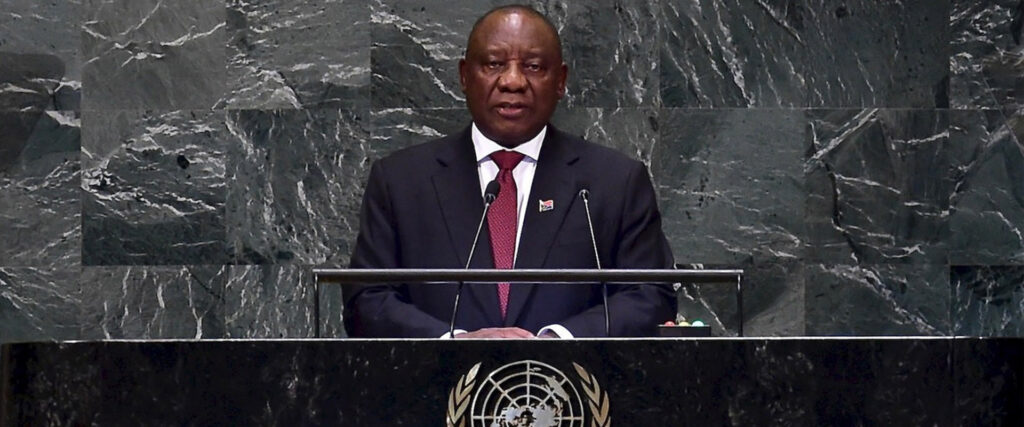MAIN IMAGE: President Cyril Ramaphosa addressing the 73rd session of the United Nations General Assembly in New York.
The business-minded approach of president Cyril Ramaphosa towards economic reform is encouraging news for the country’s real estate sector says property experts.
Ramaphosa’s R50bn stimulus and recovery plan to reignite the country’s flagging economy has generally been well received, both by the business sector and by international markets with the rand strengthening against the dollar when the president addressed the United Nations in New York in September 2018.
The property industry also welcomes the president’s plans as positive news for the property sector. Ronald Ennik, CEO and founder of Ennik Estates in a recent blog welcomed the plan as good news for the residential property market and said it is encouraging to see the rand improve.
Paul Stevens, CEO of Just Property, says: “Ramaphosa’s business-minded approach to economic reform in South Africa is encouraging, particularly because he is modelling it on global best practice, e.g. the infrastructure fund initiated by Indian Prime Minister Narendra Modi.
According to financial experts Ramaphosa’s plan mimicks that of Modi, who, since 2015 has focussed on attracting billions in foreign investment to fund infrastructure projects in India. The two leaders have made efforts this year to improve bilateral relations between their two countries.
Ramaphosa’s said this new plan is aimed at encouraging economic growth and creating much needed jobs. The following are the areas of particular interest for the property industry says Stevens:
“The suggested visa amendments, which are designed to make access to our country easier for foreigners, and increased attention on the mining sector. As efforts like this are made to increase tourism and business travel, so a potential opportunity emerges for those vested in real estate. We will be keeping a keen eye on where demand for property is likely to increase.
“Reprioritised funding that will be re-directed towards igniting economic activity in townships and rural areas. Our property transfer data is clearly indicating the opportunity here and we anticipate increased growth as a result of economic empowerment and infrastructure development in townships and rural areas.
“Collaboration between the private and public sectors is being called for more than ever, and those who embrace this philosophy will almost certainly thrive. Housing (whether it be tourism- or residential-based, short- or long-term) is a fundamental part of a country’s infrastructure. Government’s renewed focus on infrastructure is something we are encouraged by,” he concludes.
Ennik says South Africa has survived economic downturns like the present before, however where the worldwide financial crisis of 2008 was due mostly to outside economic factors, this time there is also the damage done through state capture during the Zuma era to consider.
“This is being made perfectly clear by the revelations that have been seeping out of the current Zondo Commission of Inquiry into state capture – and, not least, by way of input from the country’s major banks,” he says.
However, the South African economy, as mentioned, is resilient and Ennik says he’s confident it will recover in time.
“The state capture issue has probably been the biggest dampener that has hit the South African residential property market since democracy. But this, too, will pass in time,” says Ennik.
He tells sellers not to listed to doom talk. People must still live somewhere. Buyers should do a thorough research of the market, but not be overly hesitant. “If you see a home that really fits your lifestyle, and your family needs, act now. You will be buying at a discount anyway,” Ennik says.
This year’s hot topic, expropriation of land without compensation, has led to a lot of uncertainty, also in the property sector. Stevens urges people to seek the help of expert advisers and not act on the comments made by laypeople whose perspectives may be influenced by negative sentiments and emotion. He echoes the advice given by Johette Smuts, Head of Data and Analytics at PayProp: “Assess your financial position, assess your risks, and if you have properties as an investment and you feel the need to diversify, adjust your portfolio. But don’t make decisions based on unknown possibilities and emotion.”
Related articles: Prof Elmien du Plessis from the Faculty of Law from North-West University wrote an excellent article on the land expropriation issue for Property Professional. Read more here
Did you enjoy this article? What topics would you like to know more about? Let us know. Send an email to editor@propertyprofessional.co.za.








